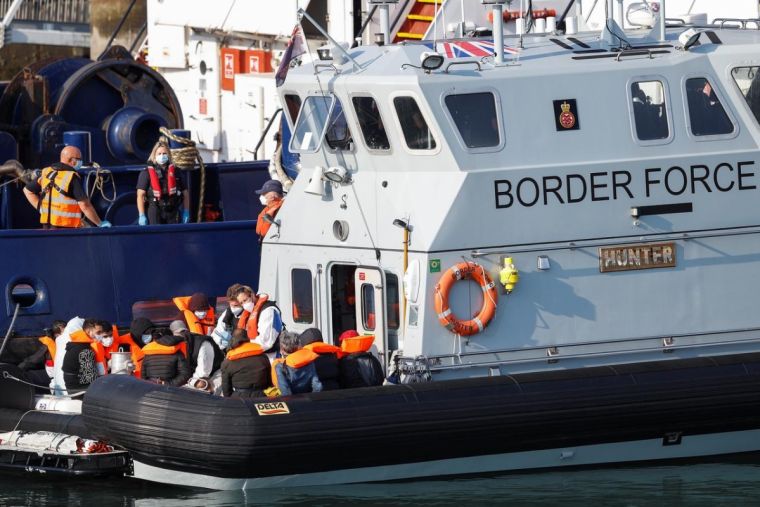What is our attitude to those seeking safety on our shores?

This week the front pages have again been full of pictures of desperate migrants on inflatable boats attempting to cross the Channel to reach the UK. The message from the media, and the government, is that they are illegal; invaders; a threat to our society. We are told that the government is considering sending in the Royal Navy to turn them away.
This may indeed be the view of much of the country. A YouGov poll has found that almost half of the British people have little or no sympathy for the migrants crossing the Channel, and a similar number believe that we have no responsibility to help or protect them. But what should a Christian response look like?
Firstly, some context. The numbers crossing the channel are relatively small compared to those landing on the shores of countries such as Greece and Italy, and even those applying to remain in France. In 2019, France received 123,900 asylum applications compared to the UK's 35,566. Those who make it this far have endured a long, wearisome journey and have often been exploited and abused by human traffickers who care little for their safety and may have fleeced them of all their money.
France is seen as a safe country, so why do people want to continue on to the UK? It isn't because they see the UK as a soft touch or a land of milk and honey; rather that they see us a land of peace and quiet. Peace and quiet? Well, yes, because these people are invariably seeking a better life. Their current lives may be beset by threats to their safety, their families, their very lives. In their own countries they face war, persecution and instability.
Of course France is a safe place, but the UK's reputation is such that a relatively small percentage of refugees will risk all to come here because we have a global reputation for being a place that is uniquely civilised, peaceful and free. We often pontificate about freedom in our debates in this country, and yet the gateway to freedom is surely stability: 'peace and quiet'. Here we are able to be free to concentrate on the 'mundane' business of earning a living, raising our families, being part of a community. Most of us take these things for granted; they give us the ability to live a normal life.
When I was the Leader of the Liberal Democrats, I visited the camps in Lesvos and in northern Greece, where a huge percentage of refugees first arrive in Europe. I spoke to them about their experiences, and a common story was that their lives were (to put it mildly) intolerable in their home country and they wanted a new life. Peace and quiet.
A tiny percentage of them (in fact none at all that I can remember) were planning on heading towards the UK. When I was in Calais visiting 'the Jungle' camp, or a year later in Paris after the French had closed the Jungle, many of those refugees did want to come to the UK. I asked them why. Their responses were because they spoke English, because they had family in the UK or - most often - because the UK is just seen as a beacon of peace and freedom. No war, no civil strife, no persecution on the grounds of race or religion. Whatever our internal tensions, I believe we should be rather proud of the fact that we are still viewed in this way by the world. And none of them had any awareness of the existence of the NHS or of the UK welfare state.
In 2020 so far, about 4000 people, including children and babies, have risked their lives crossing the Channel in inflatable dinghies. This is indeed a crisis for those in the boats, feeling that they have no other choice. But it is not a crisis for the UK: the numbers are relatively small.
But I do believe that an appropriate Christian response should certainly not be anger at the refugees, or an assumption that they are only coming here to rip us off or do us harm, or to convert us to their religions.
Exodus 22 and 23 command God's people to not mistreat or oppress foreigners, reminding us that we too have been or could have been in their position. Hebrews 13 commands us to show hospitality to strangers. Jesus in Matthew 25 says: 'I was hungry and you gave me something to eat, I was thirsty and you gave me something to drink, I was a stranger and you invited me in', and then of course in Matthew 7, Jesus tells us to 'do to others as you would have them do to you. For this is the essence of the law and the prophets'.
In other words, while there may be questions to be asked about what should be our detailed approach to asylum policy and international co-operation, if our first response to this non-crisis is to be angry, suspicious or lacking generosity towards the refugees crossing the channel then we have misunderstood the Bible. We need to remember that these refugees are human beings made in the image of God, often fleeing intolerable situations and hoping to find safety and hospitality on our shores. When the Lord gathers the nations before him on that final day, will our response to this situation place us among the sheep or the goats?
Tim Farron is Liberal Democrat MP for Westmorland and Lonsdale and former leader of the Liberal Democrats.
Views and opinions published in Christian Today are those of the authors and do not necessarily reflect the views of the website.











